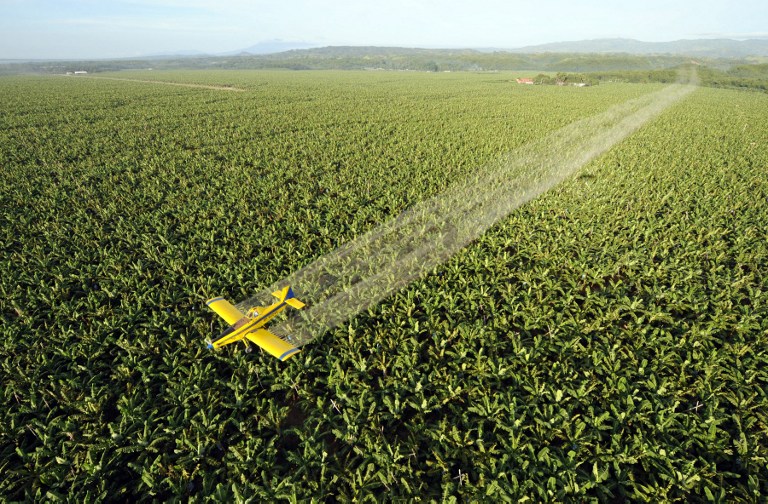

The planned revocation of two agribusiness contracts in Mindanao puts a spotlight on the state of agrarian reform in commercial farms and plantations in the country.
The first is a case filed at the Presidential Agrarian Reform Council (PARC), the highest agrarian reform policy making body, to cancel the contract between Marsman Estate Plantation, Inc. (MEPI) and over 700 agrarian reform beneficiaries (ARB) of the Davao Marsman ARB Development Cooperative.
The MEPI deal involves a leaseback agreement for 30 years covering close to 800 hectares of agricultural land.
The second is the controversial 25-year renewal in 2003 of a joint venture agreement between the Bureau of Corrections and the Tagum Agricultural Development Co. (Tadeco), owned by the family of Davao del Norte Rep. Antonio Floirendo Jr.
The agreement, originally entered into 1969 during the Marcos regime, allowed Tadeco to convert 5,308 hectares of the Davao Penal and Prison Farm into a commercial banana export plantation. While the political motivations for voiding the contracts in both cases differ, at their core is a re-evaluation of what is known as alternative venture agreements (AVAs), which were introduced after the lapse of the 10-year deferment period of redistributing commercial farms and plantations in 1998 under the 1988 Comprehensive Agrarian Reform Program (CARP).
Dissecting AVAs
An AVA is an “entrepreneurial collaboration between ARBs and private investors to implement an agribusiness venture on lands distributed under CARP,” a mechanism first introduced during the time of former president Joseph Estrada. They can take the form of lease contracts, joint ventures, production, processing and marketing agreements, build-operate-transfer, and management and service contracts. AVAs are promoted by the Department of Agrarian Reform (DAR) to sustain farm operation and enhance the productivity of lands awarded to ARBs through access to capital, farming technology, and markets provided by private investors.
DAR reports that, as of October 2015, there were 433 AVAs covering 57,734.29 hectares and involving 45,399 ARBs. These figures, however, may be understated as DAR admits it does not have a complete inventory of all AVAs. Of the total area, 11 percent or more than 6,000 hectares of lands are located in Region XI, specifically Davao del Norte, where MEPI and Tadeco are located.
Agrarian reform advocates criticize AVAs for their conceptual and policy flaws as the state virtually abandons its legal mandate to provide adequate support services to ARBs, surrendering this to the private sector. This results in ARBs being subjected to onerous arrangements that constitute a virtual reversal of agrarian reform goals such as non-transfer of control of land and production as well as unfair contracts. For instance, leaseback arrangements in pineapple plantations in Bukidnon, where ARBs rent out their land to the former landowner or company such as DOLE or Del Monte for a specified time period (usually 25 years) are deemed as "ownership without control" of the land or the income from its use.
A 2016 study by Oxfam and IDEALS on 5 AVAs in Mindanao concluded the following:
- “financial control devices written into the contract guaranteed the banana farmers’ full dependence on their buyer, with the buyer having near absolute control over the cooperative’s financial health;
- the contracts also reveal a clear bias in favor of the buyers;
- the contracts offer no effective remedy against abuses; and
- government failed to regulate AVAs and to empower farmers to negotiate from a position of strength.”
The AVA situation, therefore, has “relegated the farmers back to being workers in their own land, driving them back into a vicious cycle of debt and poverty …”
Evidence on the ground confirm that ARBs in these areas are frequently on the receiving end of contract negotiations with former landowners or companies and thus, are compelled to accept terms that are lopsided and disadvantageous to them. In some cases, AVAs are used to evade agrarian reform altogether with landowners or companies choosing their own set of beneficiaries that are loyal to them, thereby maintaining virtual control over the landholding.
These identified inherent dangers of AVAs have forced DAR (under the previous Aquino administration) to conduct investigations of existing contracts, including the case of MEPI. Similarly, during the 16th Congress, the Committee on Agrarian Reform under Rep. Teddy Baguilat’s chairpersonship conducted similar investigations in Mindanao.
Under the current leadership of Secretary Rafael Mariano, DAR is continuing the review of all AVAs and has recently revised the administrative order regulating such schemes to put more teeth into the policy. These are welcome developments. In September 2016, the PARC approved the DAR recommendation to void the AVA between the Marsman group and ARB cooperatives “for violations of several provisions of the contract lease.”
In April 2017, the country’s Solicitor General ruled that the BuCor-Tadeco agreement is void as it violates the Constitution and the Public Land Act on the length of lease, the amount of land that may be leased by a corporation, and for not having gone through a public bidding.

ARBs in commercial farms can be efficient, too
AVA advocates often argue that ARBs or small farmers in commercial lands are incompetent and inefficient in producing and marketing export bananas.
This is belied in the case of Dionisio Malaya, an ARB who was awarded land from MEPI in 2003 and is a member of the Marsman Agrarian Reform Beneficiaries Cooperative (MARBCO) who earned an annual net income of more than Php430,000 in 2015. Malaya is one of the 192 ARBs who received lands under CARP but chose to produce and operate independently under MARBCO. He argues that a “lease contract agreement will only benefit high ranking officials of the company but not the beneficiaries who remains rank-and file-workers”. MARCBO is just one of the several ARB banana cooperatives that have been managing production and marketing of bananas on their own for the last ten years.
Recent studies show that the banana export industry has changed from twenty years ago when large companies affiliated with the Philippine Banana Growers and Employers Association (PBGEA) enjoyed quasi-monopoly in their base areas.
Currently, the market is more competitive with multiple local and foreign buyers and a thriving spot market. Cooperatives take advantage of this opportunity, which allows more room for negotiating better prices and other marketing terms.
On reform and social justice
A recent survey conducted by Focus on the Global South reveal that ARBs in commercial farms and plantations have multiple visions and hope. When asked what to do with a piece of CARP-land, their responses range from pragmatism, realism and hope. They all know the risks and hard work involved in the production and marketing of cash crops. As farmworkers, they have breathed and lived with these challenges on a daily basis.
But for many of them, owning a piece of land is better than working for a landowner or company under unsustainable labor conditions, where voice and dignity do not matter.
The likes of Dionisio Malaya remain hopeful that “CARP can be truly beneficial to the landless people, much more if the DAR support program will be enhanced and abolish the lease contract scheme and AVAs in the program’s implementation”.
For the vision of agrarian reform of overturning inequalities in land ownership and control to be realized, government should take a proactive role in supporting small farmers in all croplands. This includes resisting any form of reversals of land redistribution particularly those coming from large agribusiness corporations in the guise of promoting farm productivity and exports. – Rappler.com
Mary Ann Manahan is a Senior Program Officer with Focus on the Global South, an activist think tank and advocacy organization with offices in Bangkok, Manila, Cambodia and India. Eduardo C. Tadem, Ph.D., is Professorial Lecturer in Asian Studies at the University of the Philippines Diliman and president of Freedom from Debt Coalition.